- Home
- Cherie Priest
Chapelwood Page 2
Chapelwood Read online
Page 2
I was right about part of it. Someone is speaking to the reverend in proofs and fractions, but it’s not the God of Abraham. I don’t know what it is, or what else it could be . . . Some other god, perhaps? Is that blasphemy? No, I don’t think so. It can’t be, because the first commandment said, “Thou shalt have no other gods before me.” It did not say there were no other gods; it said only to eschew them.
Would that the reverend had obeyed.
Would that I had figured it out sooner, that I was hearing the wrong voice when I scratched my pencil across the paper, tabulating columns and creating the tools the church would need to hear the voices of the universe without my assistance. It is not so easy to live, knowing that I may have given the reverend a map to the end of the world.
So I will do what I can to thwart him. I will take matters back into my own hands, and take the formulas out of my head and commit them to chalkboard, to paper, to any surface at hand, and I will beat them at their own game.
It won’t be any true victory on my part. Too many innocent people will die for this to be any great triumph of justice and virtue; and they will die at my hand, because if they do not . . . they’ll die at the hands of the church, and worse things by far will follow. So I am to become a murderer, of a man or two. Or three. Or however many, until the reverend makes enough mistakes and attracts enough attention that someone, somewhere, rises up to stop him in some way that I can’t.
Or else until he succeeds.
I must account for that possibility, and I will write it in as a variable, when I compile my equations and build my graphs. This string of numbers will haunt me until I die, or until we all do.
• • •
I have determined the reverend’s next target: an Italian woman who lives down by the box factory, and works there with her mother and sister. She is an ordinary woman, thirty years old and unmarried. Her hair is brown and her eyes are brown, too. She goes to Saint Paul’s on Sundays and Wednesdays, too, if her work and health permit it.
I will try to catch her on the way back from her confession, to leave her soul as clean as it can be. I will try to grant her that much, but if the reverend forces my hand, then I will have to take measures—so I can only pray that she prays, and prays often.
She’s done me no wrong, and her death will cause great sorrow, but it could be worse, and that’s what I must remember when I take my weapon and hide it in my coat. I must remember the equation written at the top of my slate in my hidden little flat, and I will tell myself as I strike that it is this woman tonight . . . or the whole world tomorrow.
It’s a terrible sum.
• • •
Father, forgive me—for I know precisely what I’m doing.
Ruth Stephenson
BIRMINGHAM, ALABAMA SEPTEMBER 4, 1921
(LETTER ADDRESSED TO FATHER JAMES COYLE, SAINT PAUL’S CHURCH, BIRMINGHAM, ALABAMA)
I’ve been thinking about what you told me, about demons and God and everything else we can’t see—but still take for granted. You can’t be completely wrong, and I know that for a fact because I’ve seen it myself, and I’m so afraid I just don’t know what to do. You don’t know my daddy, sir. You don’t know what he’s like, or how he gets.
You don’t know what he’s gotten himself into, but I’m going to try to explain it, and maybe you can help me . . . since you did offer to try.
• • •
It started back in January, when Daddy got caught pretending to be a minister so he could marry people, down at the courthouse. Our pastor saw him, asked what he was doing, and got a straight answer out of him, more or less. I’d give him credit for telling the truth except that he’d been caught red-handed, and he would’ve looked stupid for lying about it.
(Daddy hates looking stupid. I guess everybody does, but you know what I’m trying to say. He takes it personal when you call him out.)
So when Pastor Toppins caught him pretending to be something he wasn’t . . . they started arguing, and then before you know it, Daddy had to find a new church. He said he might as well make up his own church, if it was going to come to that, and at first, I thought that’s what he was planning. But then he got drinking and talking with some man from the True Americans, who said maybe we ought to try out the Reverend Davis’s new flock.
Daddy said no at first, because he ain’t no Baptist, but this fellow (I can’t think of his name, but it was Haint, or Hamp, something like that) said it didn’t matter, because it was supposed to be a meeting of like-minded men, and anybody who wanted to hear the word straight from the Bible with a patriotic Southern bent ought to come on out to Chapelwood for Sunday services.
I didn’t want to go, because I know what it means when somebody says “patriotic Southern.” That just means it’s made for angry white men, and to hell with everybody else, me included.
My daddy’s been angry and white his whole life, and it’s gotten him nothing but mean. It’s gotten me and my momma beat, and it’s gotten us broke, and it’s gotten him nice and drunk a whole lot—which gets him even more ornery.
And that’s about it.
But he made me and my momma go with him, out to Chapelwood where all the other angry men go. Some of their wives were there, too, but I didn’t see any children anyplace. Come to think of it, I was probably the youngest person there, and I’ll be twenty-one in August.
So we went, and I haven’t been able to shake the bad feeling it gave me ever since.
We rode up to the main house, or lodge, or whatever it is, in a cart because we don’t have a car, but that was okay with the reverend. He had somebody put our horse up, and greeted us warmly—like this was just any Sunday service—and I think Momma felt a little more at ease about it when she saw him acting like everything was fine.
The reverend was wearing all black, like you do . . . but it wasn’t like a priest’s black or a pastor’s black. It was something like a Klan robe, done up in black instead of white. It had this strange gold trim on it that almost made the shape of a star when he held still and it hung down off his shoulders. You couldn’t see his feet at all, and his hands were covered in black gloves—not leather riding gloves, but cotton, I think. Under those long arm sleeves, his hands looked strange. Like his fingers didn’t have any knuckles or joints . . . they moved like an eel moves, all smooth and just about boneless.
Please don’t read that and think I’m crazy.
He invited us up the stairs of that big building, I guess it was a house, come to think of it. Probably the biggest house I ever been inside in all my life—even though we didn’t see too much of it, just the church part in the front. It was shaped funny; it made me think of a cross between a castle and the courthouse. There’s lots of stone, lots of columns. Several towers. But it don’t look like a church, that’s what I’m saying. The stairs were wide but not too tall, and I had to make little tippy-toe steps to get up them without tripping myself. The whole thing was just so damn uncomfortable, if you’ll pardon me saying so. I knew it from standing outside, from pausing there and looking up—or from looking down at my feet, trying not to fall when I followed everybody up inside . . . that’s not a church, and it’s not meant to make people feel safe or comfortable. It’s not meant to be a friendly place that welcomes people from outside. It’s a prison, and it’s meant to keep people in.
I figured that out for sure once we went through the door. It was a little door, not something big and open that swings back and forth to let the spirit of God come and go with His people. And everything inside was dark. Not dark like your church, when the lights are down and all your candles are lit. That’s a warm, nice kind of dark, and I can still see where I’m going. In your church, there’s all that light from the colored windows, and it glitters off all the gold and the wood. Your church glows. This place . . . it didn’t give off light. It ate light.
When I was a little girl and I told
my momma I was afraid of the dark, this was the dark I meant.
I couldn’t see my own two feet at first, when the door closed behind us. Hardly even my hands, if I waved them in front of my face. I blinked a whole lot, and after a few seconds I could see a bit, but I didn’t see nothing that made me feel any better about being there.
The pews and the altar up front, all of it was painted black—and not a shiny black, like the kind that gets polished. This was black like a slate, without any gleam to it at all. There were colored glass windows up high, but they were real dark. The glass wasn’t red and blue and yellow, it was dark purple, dark green, and I don’t know what else. Maybe it was more black. For a bunch of fellows who don’t like black people, they sure do like black everything else.
Folks started moving around—I know because I heard them, not because I saw them. I think they were all wearing robes like the reverend’s . . . or they were wearing something real dark, anyway. I stood out like a sore thumb in my Easter best, like Daddy had insisted. I was wearing pink and yellow, even though it wasn’t spring at all.
Then my parents disappeared, or I thought they did, and I thought about yelling—but my momma grabbed my arm and told me she was right there, and everything was all right. Someone had come up behind her and put one of those robes over her, and I guess they did it to Daddy, too, but he didn’t say anything about it. I think he left. I think they took him someplace else to talk with the reverend.
Someone took me and my momma to one of the pews and had us sit down, so we did. I was shivering, partly because I was scared, and partly because it was hardly any warmer inside than it was outside—and it felt real damp. It felt like the inside of an icebox with a block that’s mostly melted, so it’s all cool and wet inside.
I held my momma’s hand tight, and she held it back, but she didn’t really strike me as being too worried. I don’t know if Daddy had a word with her beforehand and told her what to expect, or if she’s just so used to being scared of things that this wasn’t any big deal to her.
Anyway, the reverend started his sermon, if that’s what it was.
Mostly he talked about how our idea of heaven isn’t right, because most people think of heaven as being some pretend place, or something that happens to us when we die—but he says it’s not. He says it’s a real place, and it’s out beyond the stars . . . so far away that if we looked up with the biggest telescope in the whole world, we wouldn’t be able to see it. He says the constellations are a map, and that there’s a God, yes, and there are other things that aren’t exactly angels, or not angels how we’ve always thought about them. He says that a whole lot of years ago, these other kinds of angels lived here on earth. They lived in our oceans, and they ruled everything, and people served them. Eventually, they left us and went back to the stars, and someday, they’re coming back. The reverend knows this, because he says they talk to him. He says he’s found more maps, not just the constellations, and not just the things buried in rocks that are a million years old.
I don’t know, Father Coyle. It all sounded like craziness to me—and if that’s the kind of god who’s coming back to call us all home, I don’t think I want to go with him.
(But while he was talking, I got the weirdest feeling that the windows up above, near the ceiling, were moving around somehow. Maybe not the windows themselves, but the patterns—like they were swirling or spinning, I’m not sure. Maybe there were clouds overhead, and the light was doing funny things. Maybe my eyes were just playing tricks because it was so dark in there, and I’d been there for so long.)
Finally, the reverend was finished and I thought it was time for us to go. I said a little prayer to the regular God, telling Him thanks for letting me out of there because, I’m telling you, it was so dark I could hardly breathe. Does that make sense? Well, maybe it don’t. But that’s how it felt.
We stood up to go, me and Momma, and something touched my arm. I want to say somebody touched my arm, but it didn’t feel like a hand grabbing me—it felt like a snake, wrapping around my wrist. Cold and smooth, all muscles and no bones, like the reverend’s fingers inside his gloves (but much bigger). It was real strong, and it squeezed me real tight, so I let out a little yell and jumped back, and it let go of me.
The church door was open, and a little bit of light came inside so I ran toward it, and I practically threw myself out onto the stairs. I stumbled down them and I was breathing heavy, trying to catch my breath even though I hadn’t run very far.
I’m telling you, I couldn’t get out of there fast enough.
But I couldn’t get as far as I wanted. I felt dizzy and tired, even as scared as I was. I didn’t know where they’d taken the horse or the cart, so I didn’t know which way to go in order to get myself home. I wasn’t thinking so clearly. I was almost dizzy from all that darkness, all that being inside someplace so closed up and crowded. I wasn’t sure what to do, so I stopped at the bottom of the steps.
That’s when I heard them talking, my daddy and the reverend—or I guess it could’ve been someone else. Everyone had those robes on, and they still had their hoods up, so it was hard to tell who was who (but I knew Daddy’s voice when I heard it). They weren’t quite whispering but they were chatting all quiet-like, just inside the church. I couldn’t see them, but their voices came floating down in bits and pieces, and mostly what I gathered was that they were talking about me.
I don’t like that place, Father Coyle. I don’t want to go back there, and I don’t want to see the reverend again—but Daddy’s already talking about heading there next Sunday and I don’t think I can stand it. Please, sir, if there’s anything you can do, anybody you can talk to . . . I need a friend.
I need help.
Lizbeth Andrew (Borden)
FALL RIVER, MASSACHUSETTS SEPTEMBER 4, 1921
I was making tea when the newspaper arrived this morning, hitting the porch steps with the usual graceless ruckus and startling the cats who gather there waiting to be fed. Sometimes I think the paperboy aims for them, and it’s some stupid, childish sport; but if that’s the case, then his aim is worse than his manners when he comes to collect his fee on Tuesdays. Thus far, no cats have been struck, and they are content to sit in a row and watch him ride past on the new red bicycle his parents bought him last month. They stare at him with lazy, narrowed eyes, but ears and whiskers on high alert.
They know a brat when they see one.
I finished the tea and poured myself a cup with just a dusting of sugar, and gathered the scraps and kibbles the cats have come to expect. Then I made my donation to the feline breakfast fund, and took a seat in my rocking chair to watch while they politely cleaned their plates and licked their little chops.
They have no idea who I am, apart from their personal kitchen staff—and they wouldn’t care if they did. They are forever tidy, civil, and gracious, and I am charmed by their tendency to climb into my lap and purr . . . working in tandem with the tea to keep me warm on the chillier mornings.
This morning, it was chilly but not so bad that I did not sit with them for a while in companionable quiet—the paperboy notwithstanding.
I’m not being fair.
I’m sure it’s just the boy’s job, that he’s been told a thousand times to aim for the front door. I’ve made that impossible for him, haven’t I? When I rebuilt the front porch a few years ago, I made sure to give myself privacy, and the cats some shelter for the nastier days of winter. He couldn’t hit the front door unless he came inside and stood before it. I suppose he does the best that he can.
But I’ve heard him whisper, when I’ve gone to town. I’ve seen him, and his nasty little friends. I know what they call me. I know what they say, when they think I’m out of earshot. It’s nothing new, and by now you’d think I’d be accustomed to it, but sometimes it gets under my skin all the same.
I ought to be too old to give a damn.
• • �
�
But I do like the cats.
Emma, when you were alive, I hated to shoo them away—through no fault of their own, they made you sneeze, and you had problems enough breathing without their accidental interference. Now that you’re gone, I can lure them as close as I like, and even let them inside if they’re amenable to it. Most of them are content to remain outdoors, but one or two prefer the fireplace around January. Who can blame them?
Now that you’re gone, and Seabury’s gone, too, I take my friends where I can get them.
Sometimes even now, especially late at night, I think I can hear you, Emma—up in your room, which I’ve made into an office. I awaken in the wee hours to the sound of a bell, like the one you used to ring when you needed me. In my dreams your voice is no longer feeble; it doesn’t struggle for volume, or crack when you raise it. It’s the voice of a stronger, younger woman than I knew you last: the woman you should’ve been, and might have been, if things had been . . . different.
So if anyone haunts this place, I know good and well it’s you. And yet, despite my esoteric interests, I’m afraid to make any effort to find out for certain.
• • •
I wonder if Doctor Owens haunts his old home anymore.
I thought I saw him there once, after his funeral. I attended in black and a veil—not that it concealed my identity in the slightest—because I wished to show my respect for a man who was such a fine friend and ally in difficult times, never mind that his mind was so badly troubled in the end. I needn’t have bothered with my civilized disguise. Only three people attended the service, he was so far gone to the community by the time he left it for good.
He lingered until 1899, barricading himself into that grand old house he once shared with his wife; and then he left to join her in the cemetery by the old Presbyterian church on Eighth Street. I’m not sure who found him, but he hadn’t been gone very long—I know, because I’d seen him only a few days before.

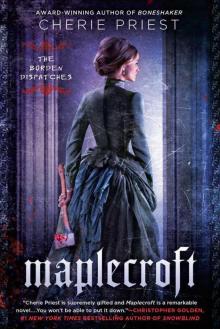 Maplecroft
Maplecroft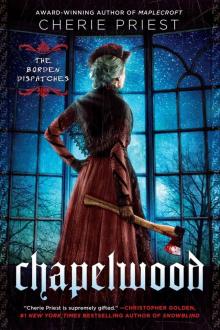 Chapelwood
Chapelwood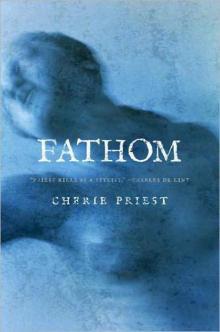 Fathom
Fathom Hellbent
Hellbent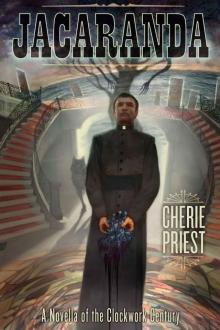 Jacaranda
Jacaranda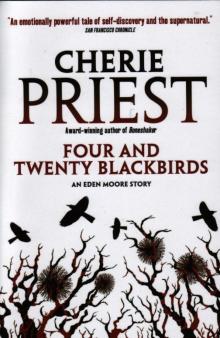 Four and Twenty Blackbirds
Four and Twenty Blackbirds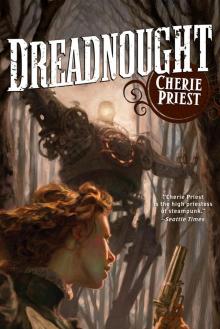 Dreadnought
Dreadnought Dreadful Skin
Dreadful Skin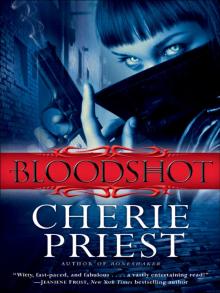 Bloodshot
Bloodshot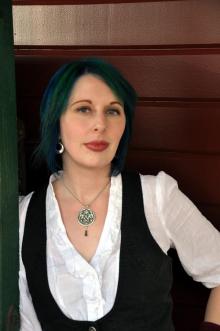 Tanglefoot
Tanglefoot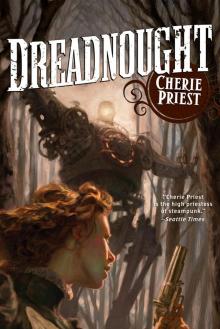 Clementine
Clementine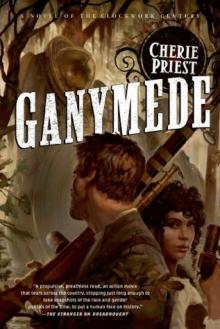 Ganymede
Ganymede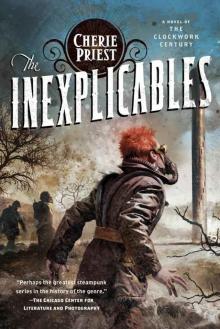 The Inexplicables
The Inexplicables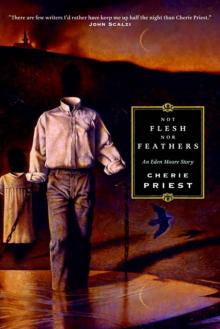 Not Flesh Nor Feathers
Not Flesh Nor Feathers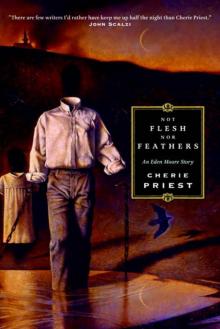 Wings to the Kingdom
Wings to the Kingdom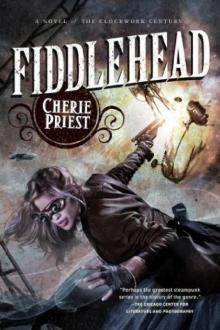 Fiddlehead
Fiddlehead Tanglefoot: A Story of the Clockwork Century
Tanglefoot: A Story of the Clockwork Century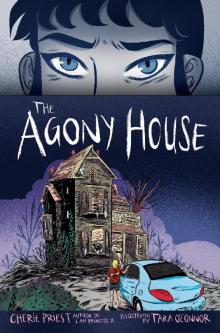 The Agony House
The Agony House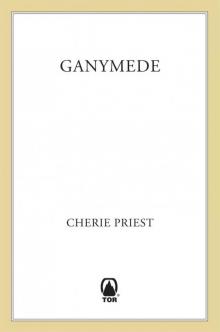 Ganymede (Clockwork Century)
Ganymede (Clockwork Century)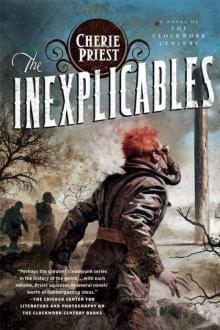 The Inexplicables (Clockwork Century)
The Inexplicables (Clockwork Century)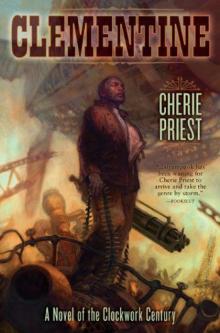 Clementine tcc-2
Clementine tcc-2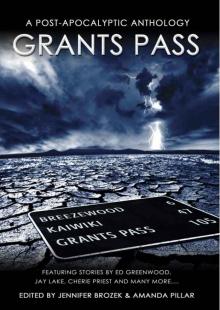 Grants Pass
Grants Pass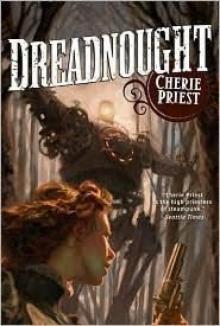 Dreadnought tcc-3
Dreadnought tcc-3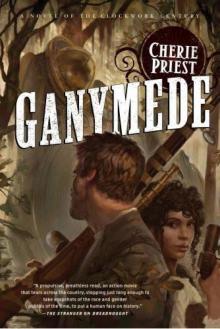 Ganymede tcc-4
Ganymede tcc-4